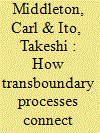|
|
|
Sort Order |
|
|
|
Items / Page
|
|
|
|
|
|
|
| Srl | Item |
| 1 |
ID:
174816


|
|
|
|
|
| Summary/Abstract |
In this paper, with a focus on Japan and Thailand, we outline a relational environmental and economic history of East Asian economic integration (EAEI) and its implication for the commons in both places. We draw attention in particular to global commodity chains as relational processes not only of trade and investment, but also geopolitics and aid, to argue that these transborder processes have connected together commons in distant localities resulting in their simultaneous enclosure, dispossession and (re‐)commoning with implications for community vulnerabilities in positive and negative ways. To demonstrate this argument we analyse three periods of EAEI: the late nineteenth century until World War II, when Japan and Thailand both began to modernise and new trade and geopolitical relations emerged in the context of colonialism; the post‐World War II recovery until the Plaza Accord in 1986, during which time Japan rapidly industrialised, as did Thailand to a lesser extent and regionalism was largely defined by US hegemony; and the post‐Plaza Accord period, when Japan deindustrialised its labour intensive manufacture and heavy industry and Thailand rapidly industrialised and EAEI became defined by new and intensified global commodity chains.
|
|
|
|
|
|
|
|
|
|
|
|
|
|
|
|
| 2 |
ID:
174830


|
|
|
|
|
| Summary/Abstract |
Viewing the Salween River as a transboundary commons, this paper illustrates how diverse state and non‐state actors and institutions in hybrid and multi‐scaled networks have influenced water governance in general, and large dam decision‐making processes in particular. Putting power relations at the centre of this analysis and drawing on the conceptual lenses of hybrid governance and critical institutionalism, we show the complexity of the fragmented processes through which decisions have been arrived at, and their implications. In the context of highly asymmetrical power relations throughout the basin, and the absence of an intergovernmental agreement to date, we argue that hybrid networks of state and non‐state actors could be strategically engaged to connect parallel and fragmented decision‐making landscapes with a goal of inclusively institutionalising the transboundary commons and maintaining connected local commons throughout the basin, foregrounding a concern for ecological and social justice.
|
|
|
|
|
|
|
|
|
|
|
|
|
|
|
|
| 3 |
ID:
147935


|
|
|
|
|
| Summary/Abstract |
The countries sharing the Lancang-Mekong River are entering a new era of hydropolitics with a growing number of hydropower dams throughout the basin. Three ‘powersheds’, conceptualised as physical, institutional and political constructs that connect dams to major power markets in China, Thailand and Vietnam, are transforming the nature–society relations of the watershed. In the process, new conditions are produced within which the region’s hydropolitics unfold. This is epitomised by the ‘Lancang-Mekong Cooperation’ framework, a new initiative led by China that proposes programs on both economic and water resource development, and anticipates hydrodiplomacy via China’s dam-engineered control of the headwaters.
|
|
|
|
|
|
|
|
|
|
|
|
|
|
|
|
|
|
|
|
|